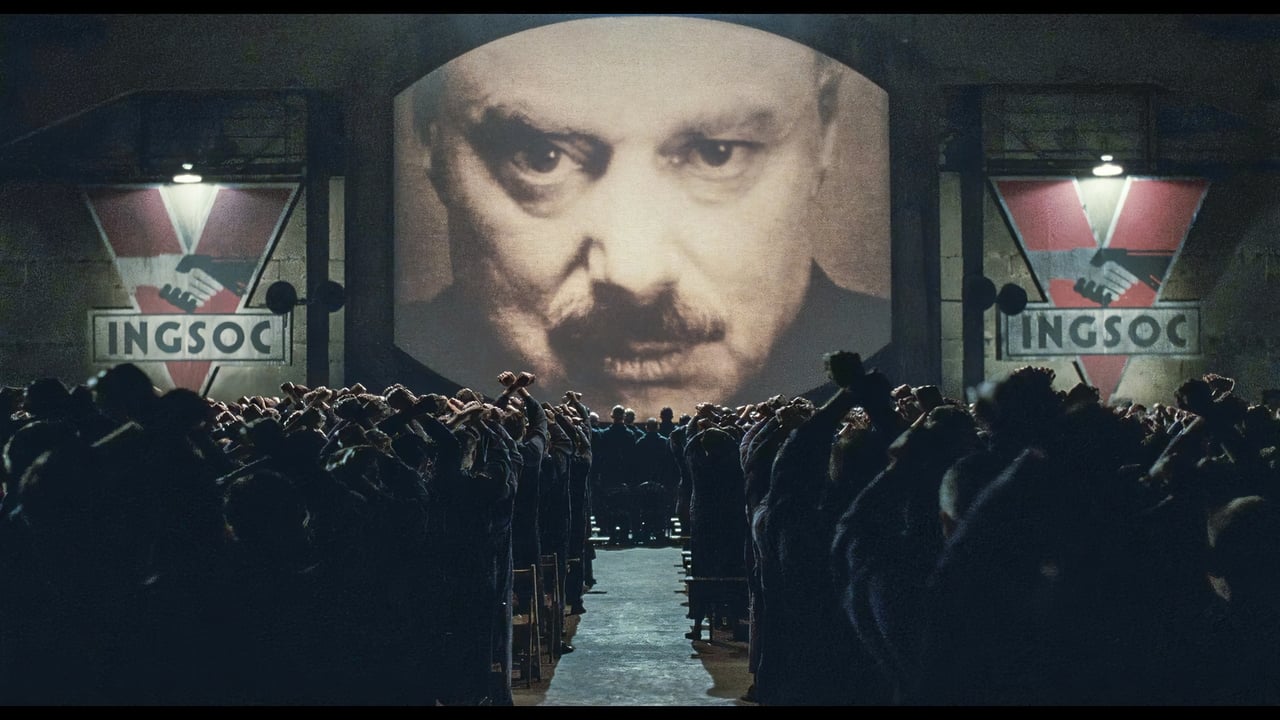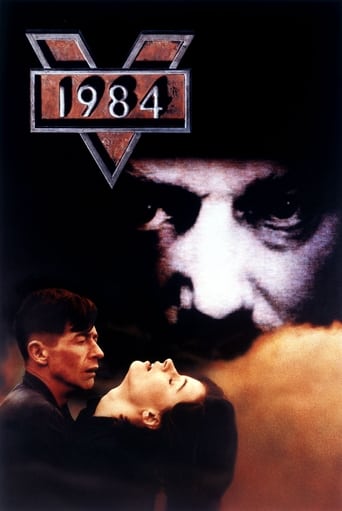



Yawn. Poorly Filmed Snooze Fest.
Sorry, this movie sucks
Better than most people think
The film was still a fun one that will make you laugh and have you leaving the theater feeling like you just stole something valuable and got away with it.
View More"Freedom is the freedom to say two plus two equals four." Writes Winston in his diary sitting on a stool in a corner where the telescreen cannot direct what he is doing. Winston lives in a world dominated by telescreens and microphones, a world where people have two hands, two legs and the body of a human, but the mind of a sheep, repeating what has been told by the party and their leader Big Brother, a face with two eyes, but with no identity of the person. In such a world where privacy is a scarce commodity, Winston is the last man with an original brain, which understands the wrongdoings of the party and wants an opportunity to express itself.George Orwell's novel 1984 answer the basic question of our political system- can an individual face the might of the government? The answer is no. An individual, however hard he/she tries cannot face the might of the party and gets decimated ultimately. Such is the story of our character Winston, a citizen of a vast country called Oceania. His only problem is that he is denied the pleasure of ignorance and brainwashing unlike other people; He wants to challenge the power of Big Brother despite knowing that the consequences would be fatal- vaporized from the face of the earth. Winston, urged by his overflowing desire of rebellion, has an affair with a woman called Julia. It was a political act against the party and Big Brother. However, like most situations where world wins and individuals loses, Winston and Julia's rebellion is crushed by brutal force and they are taken into room 101, a place with no dark, but still holding the worst thing of the world. There they are subjected to pain and through pain their love and their yearning to be free is squeezed out- the things which made them a man. Winston understands that 2 plus 2 is not 4, but anything that the party wishes. Sometimes five and sometimes three. This movie by the awesome acting of John Hurt (Winston) Shows that human brain is nothing but a playing toy in the hands of powerful people as is a doll in a child's hands.
View MoreFilmed in London during the Spring of 1984, and released later that year. An enormously powerful and chilling adaptation of Orwell's novel. The best translation of a book to screen that I have ever seen.Written in 1948, the novel depicts a society where all but the Inner Party scratch out a meager existence. War is constant, and all goods are rationed harshly. Big Brother is the face of the omnipresent State, which monitors its subjects with large telescreens (two-way TVs). Political orthodoxy is brutally enforced, and no dissent is tolerated.The film stars John Hurt, who is understated and spectacular at the same time. His Winston Smith is a man who has learned to mask his feelings, but he has not succeeded in numbing them. He is a bit too old for the part as written, but it works for the film, with his haggard look suggesting a life of toil and deprivation.>>>SPOILER<<< In his last role, Sir Richard Burton plays O'Brien, the Inner Party member who takes an interest in Winston. He is soft-spoken, polite, and utterly matter-of-fact as he tortures Winston in the final third of the film. These scenes in the Ministry of Love are so brutally realistic that I have great difficulty watching the last part of the movie. >>>SPOILER<<<The original theatrical release (when I first saw it) incorporated songs by the Eurhythmics written just for the film. If you can locate that version, I highly recommend it. I believe their stuff was removed from more recent DVD/Blu-Ray releases, but I am not sure why or which versions.I read the novel in junior high, and was very taken with it. I am a lifelong science fiction fan. "Nineteen Eighty-Four" is Must-See.
View MoreDear Michael Radford, you did a great job adapting Orwell's novel for the big screen.I loved the tracking shot of all those sinister looking people at the beginning of the movie. What a way to start the film. You had me hooked! The close ups of John Hurt's cold and dry face was used to great effect. It sort of underscored the lack of joy and humanity in him. The film was filled with such thin, wiry and robotic looking actors who gave the impression of slowly wasting away. The oppressive post-war imagery characterized by scenes of destruction and decaying grey buildings perfectly evoked the atmosphere in Orwell's novel. The sets were magnificent. I know it is an odd word to use for such a depressing film. But Winston's workplace and O'Brien's office deserve special mention. This must be Alan Cameron's best work. He later worked mostly in commercial big budget films. If anxiety was the natural state of 20th century man (from Mailer), John Hurt's jaded facial expressions and scraggy demeanor expressed all the anxiety of living in a totalitarian state. Winston Smith must be one of his best roles. Best Regards, Pimpin.(7/10)
View MoreThe movie comes across as robotic, passionless and bleak. And that is not a criticism. It's exactly the way it should be. This is George Orwell's "1984" after all - his frightening portrayal of a future fascist state and its desire to turn its citizens into mindless and passionless robots existing in a bleak society. It's a movie adaptation of a book, of course (a book I read many years ago) and so there can be quibbles about how well or how poorly Michael Radford (who directed this and wrote the screenplay) captured the novel - but I thought that certainly in terms of the mood he created he did a marvellous job. Even the repeated exchanges of "I love you" between Winston and Julia were robotic and passionless - a robotic rebellion against a robotic society. Basically I thought this was very well done. John Hurd did a good job as Winston, and Richard Burton as O'Brien, who comes to represent the fascist state for us as he tortures Winston in an attempt to "rehabilitate" him was quite good in this - also cold and passionless throughout. Suzanna Hamilton's Julia was almost eerily robotic, in spite of the fact that she was really the lead protagonist, leading Winston into rebellion against the control of Big Brother.The portrayal of the state was interesting as far as it went. Winston's job was the constant re-writing of history so that the past would always support the party line of the present (summed up by the motto "whoever controls the past controls the future, and whoever controls the present controls the past.") In addition to that there was the relentless propaganda, constant surveillance, and continual war as a means of controlling the population and giving them an enemy to vent against (probably by doing so preventing them from releasing their frustration against their own country.) The internal "enemy" revolved around the figure of Emmanuel Goldstein. Did he really exist? I'm not sure. Or was he just a mythical figure invented by the state, so that anyone who didn't buy into the society could simply be denounced as a follower of Goldstein and Goldstein's ideas; a part of an organized conspiracy against the security represented by the state. Even the concept of "Big Brother" is intriguing - and the question was raised in the movie. Was there really a Big Brother, or was there just "the party" who invented this leader image of "Big Brother" (complete with the ubiquitous portrait that looked down on everyone?) I'd guess the latter.What I found most unsettling about this was actually how relevant it remains today. Propaganda, the manipulation of news, image politics and the idolization of "leader" figures, unending war, the rewriting of history to suit the present, the willingness of some politicians at least to outright lie (and to be believed by many even as they lie shamelessly) - all of this is a part of the reality of many (perhaps most) Western "democratic" countries today. Orwell was writing fiction - but was he also a prophet of sorts?It would help to have read the novel before watching the movie, because by their very nature novels can give more details and background, but in terms of the overall mood and bleakness of the society: the movie captures this brilliantly. (8/10)
View More